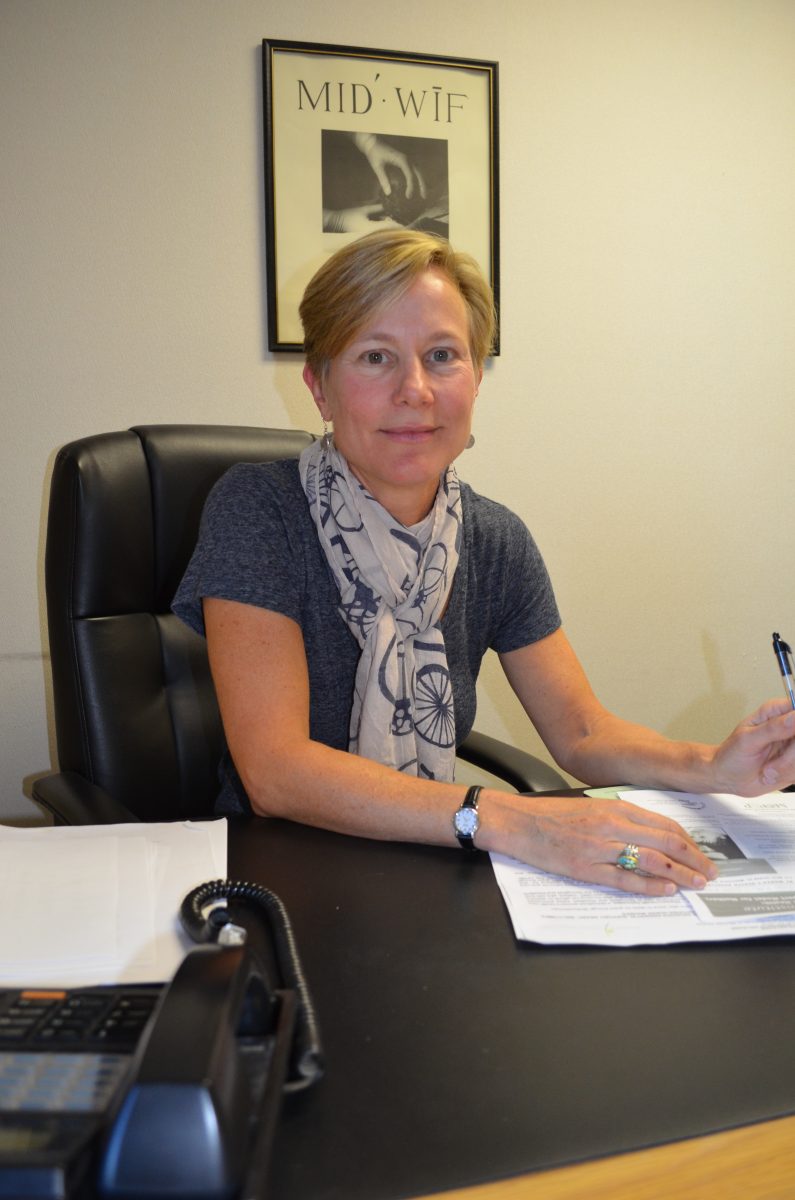WESTFIELD – Anne Vaillant, C.N.M., is spearheading a perinatal support grant through MotherWoman and the Massachusetts Department of Mental Health for women in the Greater Westfield area.
Vaillant, a North American Menopause Society certified menopause practitioner and MotherWoman Postpartum Support Group facilitator, recently rejoined Women’s Health Associates on Springfield Road after focusing her efforts on applying for – and receiving – a Community-Based Perinatal Support Model™ Massachusetts (CPSM-MA) grant through MotherWoman, the state Department of Mental Health (DMH), and the Massachusetts Child Psychiatry Access Project (MCPAP for Moms). The grant will allow the practice to not only identify and treat perinatal depression, but will also provide the resources to develop and guide support groups.
MotherWoman, headquartered in Hadley, has been partnering with communities across the state for the past six years to address perinatal mental health so that mothers can receive the care and treatment they need. In 2014, MotherWoman selected six diverse communities for its CPSM program which included Springfield, Brockton, Cape & Islands, Greater Lynn, Greater New Bedford, and Worcester. When a request for proposals for additional communities to participate was launched, Vaillant and her colleagues at Women’s Health Associates were honored to be among those chosen for the grant.
“Postpartum depression affects one mother in five and it is estimated that one in every three women experiences depression during pregnancy,” said Vaillant. “With numbers like these, it is imperative that all of us increase our understanding of perinatal emotional complications and share resources to build a stronger safety net for all women and families in our community.”
The CPSM-MA grant will give providers in greater Westfield and the hilltowns the tools necessary to build a leadership team with key partners from primary care, mental health, social service, and mothers with lived experience of postpartum depression. The grant will also create a city-wide coalition to address perinatal mental health issues, develop strategies to address barriers to care, and provide perinatal support groups for mothers at risk for or experiencing perinatal depression.
“The grant provides a rare opportunity to work closely with experts in the field of perinatal mental health,” she said.
Vaillant, a mother of two, knows firsthand the roller coaster ride that women experience while pregnant, as well as after giving birth.
“One of the big risk factors for prenatal and postpartum depression is a history of depression earlier in your life,” she said. “I had that history prior to getting pregnant the first time, so as things started to spiral out of control in the second half of the pregnancy, I could recognize the signs and ask for help.”
Vaillant said she was living “in a big city with a lot of resources” during her pregnancy and was able to receive referrals and support quickly.
“I think even as a midwife it was hard to know just what constituted ‘normal’ with my first pregnancy,” she said. “Plus, like many women, I was getting so much free (and often contradictory) advice from friends, family and strangers alike about baby blues and hormones that I was pretty far gone before I could acknowledge I needed help.”
Vaillant said her mood plummeted even further after her first daughter was born and she ended up starting medication within the first month.
“I feel strongly that for me it was absolutely the right decision, and probably saved my life,” she said.
When Vaillant was pregnant a second time, she said because she knew more – she was “better prepared” for the anxiety that she experienced once again.
“So much of the difference I noticed was in how I could love my children,” she said. “Suddenly I could connect with them, and my partner again, and feel real joy in being with them which I totally didn’t feel before.”
Vaillant, along with Robert S. Wool, M.D., Jacqueline S. Kates, M.D., Amy L. Metzger, C.N.M., and Debbie Ames, C.N.M., all of Women’s Health Associates, will be working collaboratively with Baystate Noble Hospital, Westfield High School, Westfield Infant and Toddlers, and the Hilltown Community Health Center on the grant.
Women’s Health Associates will also host a training session Nov. 12 from 2 to 5 p.m. at Baystate Noble Hospital titled “MotherWoman Training Institute: Promoting Maternal and Infant Mental Health: The Community-Based Perinatal Support Model for Mothers.” Nurse CE’s and social work CEU’s will also be awarded after completion of the program. Presenters are Annette Cycon, LICSW, founder and director of training, MotherWoman, and Liz Friedman, program director, MotherWoman and the Massachusetts Governor’s Commission on PPD. For more registration information, contact Vaillant at (413) 562-8306 or via email to [email protected].
As the grant program slowly takes shape, Vaillant and her colleagues are enthusiastic about the overall goal – to create a community of people who know about the path that women are walking. Individuals interested in becoming facilitators are encouraged to attend a training session Oct. 22-24 from 8 to 5 p.m. at the Chicopee Resource Center. For more details, contact Vaillant.
“We also want to build a framework through support groups in Westfield and the hill towns that helps women avoid spiraling into depression in the first place,” said Vaillant. “Our facilitators will share their empowerment stories with women and remind them they are not alone.”
As Vaillant assesses her 20-year nursing career helping to keep women healthy – her takeaway is simple.
“This may sound simplistic but most of the time it boils down to two things – being welcomed in community, and being free to tell the whole truth,” she said.


